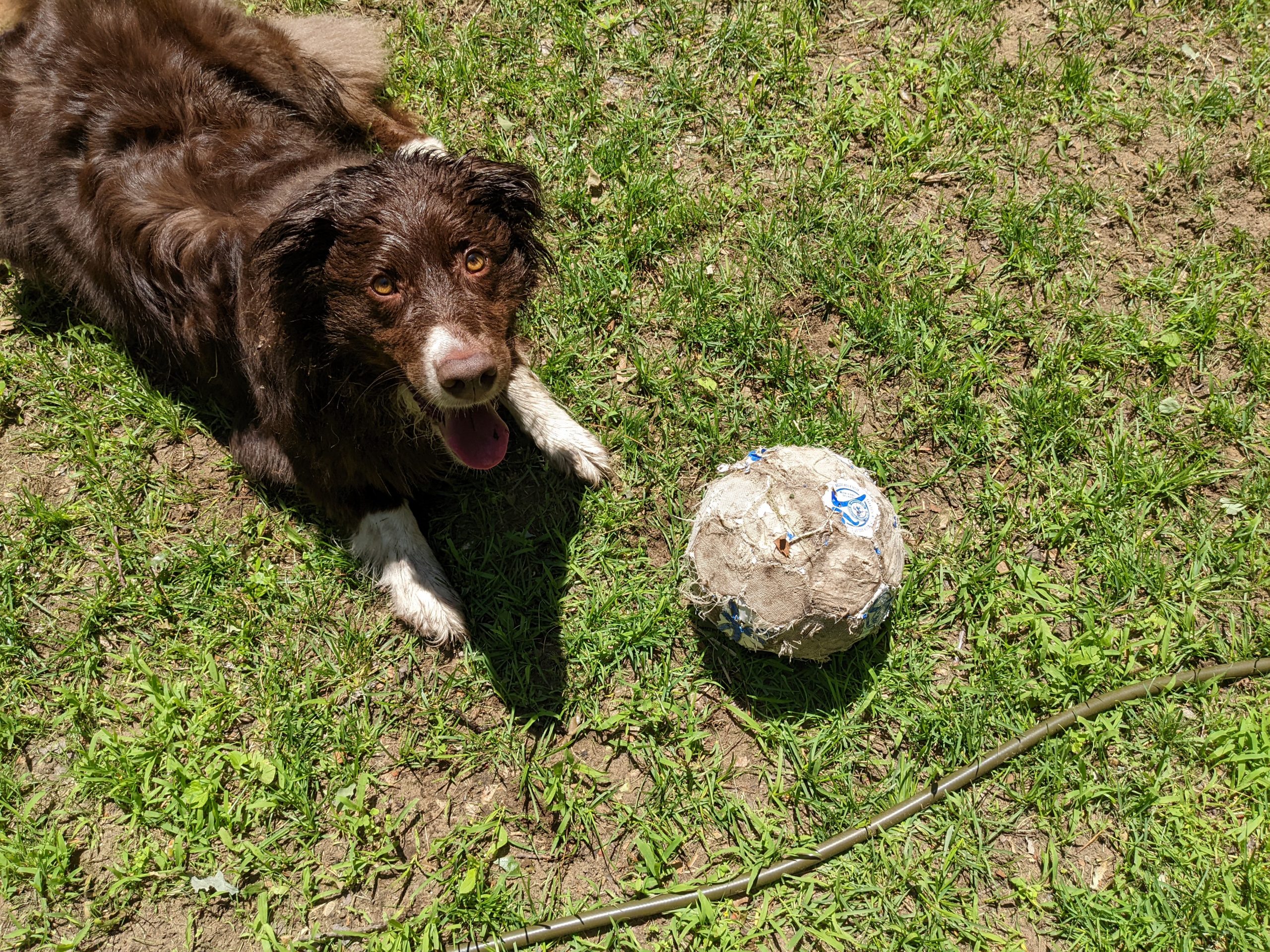
It’s time for a change. I started (consistently) publishing this blog about two years ago, maybe a little longer. As many of you know, I also recently started The Research Bites podcast. I am posting one blog post a month and about one podcast episode a month. That’s really not as frequently as I’d like to be posting either one. But, I am currently maxed out as far as my time goes. I think the podcast is extremely valuable because it is a wonderful platform for bringing research directly to those of you living and working with dogs. At the same time, I’d hate to let the blog go entirely.
So, I’ve worked out a compromise, of sorts. I plan to start to do some solo episodes of the podcast where it is just me talking about various topics related to applied animal behavior science. Essentially, a spoken version of the blog. (Don’t worry – you’ll still be getting the interviews as well). I will then post transcriptions of the podcast to this blog space. Now you will be able to choose between listening to the podcast while you multi-task or finding a few moments of downtime to enjoy reading the content.
As the upcoming posts will be a transcript of my spoken recording, they will be a little less formal than the posts you are used to seeing, but all of the same content will be there. And if you listen to the podcast and would like to go back and reread the topic later, it will be easy to access.
I am always open to change and welcome feedback from my readers, listeners, and students. Please communicate with me about what you love, what you don’t like, and what you’d like to hear me talk about! You can post in the comments or e-mail me at kristina@smartdogtrainingandbehavior.com.
With that said, here is the transcript of my first solo podcast. You can find the podcast itself here, or on Stitcher, Spotify, or Apple Podcasts. If you’d like to skip the updates and go straight to the behavior information, start at the section labeled “The intersection between personal experience and science”. Enjoy!
Transcript

Hello and welcome. I’m Dr. Kristina Spaulding, and this is the Research Bites podcast, brought to you by Science Matters Academy of Animal Behavior. We foster conversations about science and its application to animal training and behavior in an effort to improve well-being for animals and the people they live with. Please enjoy geeking out about the science of behavior.
About Dr. Spaulding
Hi guys, it’s just me today. And I have been thinking a lot about the podcast and what I want to do with it. I definitely still want to continue to do a lot of interviews with researchers. I think that’s really valuable and that’s really the core purpose of the podcast. At the same time, I would like to be able to bring you guys more episodes. And so, what I’m going to do is I’m going to sometimes include episodes where it’s just me talking and sharing my thoughts about behavior.
I want to talk a little bit about who I am and why I’m here, and why I’m doing this. Many of you already know me. I’m Kristina Spaulding. I own Science Matters Academy of Animal Behavior LLC. I have a PhD in biopsychology and I am a Certified Applied Animal Behaviorist. I have been working with dog behavior issues with dogs since about 2000, so almost 22 years.
Prior to that, I spent a couple of years volunteering and then working at an animal shelter. So, I have a little bit of animal sheltering experience as well. And now with Science Matters, I am primarily interested in educating professional animal people, primarily dog people—but it doesn’t have to be limited to dog people—about the science of animal behavior. And I know that it’s really hard to keep up with the research. There’s a lot of it, it can be difficult to access, and it can be very technical.
Increasing dialogue
That’s the role that I am trying to play in bringing that information to people. But not just that—I am also really trying to increase the dialogue between researchers and animal behavior professionals. Because I think that’s so critical to both improving the quality and the applicability of research. Not that I’m saying that the research coming out now isn’t high quality. But, I think by having that increased interaction between the people who are actually on the ground right now…a lot of the research that’s being done is what’s called basic research. That means it’s research that people are doing because they’re interested in finding this information out about behavior, but it doesn’t necessarily have an applied goal, so to speak.

If we could bring more of that into the field, I think it would be greatly beneficial. And then, of course, improving the access to research for animal behavior professionals would be very beneficial to professionals and the animals that we work with. I’m ultimately here because I love science, because I love behavior, because I love animals—both humans and other animals—and because I care deeply about emotional health and well-being. I also care about compassion and kindness and respect. And empowering people to be the best they can be and recognizing their strengths and their value in the world. The things that my students are doing are just incredible and amazing, and it’s very, very inspiring. And I really believe in the power of knowledge.
I believe in the power of knowledge to lift up people and other animals and to make the world a better place. And it’s not just science. It’s also that knowledge that comes from that direct hands-on experience of working with the animals. That intersection between the two—of the scientists, and the researchers, and the academics, and the people who are actually directly working with and living with these animals. I think by promoting that intersection and increasing that dialogue, we have the potential to really transform our ability to understand and help the animals in our lives and subsequently help people as well. And again, just make the world a better place. My goal with this podcast is to really bring in new voices. Obviously my own, but also other researchers—as I’ve already interviewed—as well as new perspectives to enhance our own current understanding.

Different perspectives
So sometimes you’re going to see me bringing in people on the podcast that are not dog people. Or they’re not necessarily applied animal behaviorists. In fact, frequently, they will not be applied animal behavior people, but sometimes they’re not even dog people. I think that having those additional perspectives really has the power to expand our knowledge and understanding. It can help us look at things in different ways. And it can help us develop more creative and innovative solutions that we may not have thought of otherwise.
Another thing—I feel like I’m talking about intersections a lot—another thing that I don’t talk a lot about in my webinars is that I really strongly believe in this intersection between science and spirituality. That is, this belief in the interconnectedness of everything and this idea of something that is greater than ourselves.
This is something that I probably will not talk a huge amount about on the podcast. But, I do want to bring it up here because I think that there is often a myth or a misunderstanding about scientists and researchers. That they are cold and they lack passion. And I have to say that my experience both as an individual, as well as interacting with other researchers, is that the opposite is true.
Researchers are some of the most passionate and awestruck people that I know. They are really coming at their work and, and putting in all this effort and struggle because they care so deeply. Because they are so passionate and because they see, oh, it’s so hard to put it into words, right? But they have this incredible reverence for the animals in our world. And they care deeply about what it is like to be a companion animal in this world, and what that means for their welfare and well-being. As well as what that means for their relationship with us and what we can do to make sure that we are giving them the best lives possible.
So periodically some of that may sneak in. Again, I don’t necessarily talk about it a ton, but I do think that all of these things are connected. Ultimately what this comes down to is that I believe that we can make the world a better place. And that is really what this is all about. So, expect to see more frequent podcast episodes from me, as well as interviews between me and other researchers. I would love for you guys to let me know what it is that you are interested in hearing more about. I am happy to talk about a wide variety of topics related to the science of behavior.

The intersection between personal experience and science
I think before I wrap up today, I don’t want to just talk about what I’m going to talk about in the future. So I want to share a story with you guys. This is something that has happened to me in many different instances and many different ways throughout my professional career. I wanted to share one of the more recent and profound instances of this happening. What I’m talking about, again, is this intersection between my personal experience and science.
Those of you that have spent any amount of time around me know that I spend a lot of time talking about my Australian Shepherd Finn. I love him very dearly. He’s a very special dog. I talk about him partly because I love him so much and I love to talk about him. But really I think what it comes down to is that his story is so interesting to me. It has really helped me grow in my understanding of behavior and especially how we can use other perspectives to inform our understanding of dog behavior and improve our ability to work with them.
The story of Finn
Finn came to me at nine weeks old. He came from a very responsible breeder that did tons and tons of work with him in terms of socialization, house training, and just really excellent care prior to coming to me. And he has had a huge amount of behavior problems that he has really struggled with. If I were to summarize what’s going on with Finn, I would say that he has really big feelings, right? And so if we’re going to put that in more technical terms, he has extremely high arousal levels. Ultimately, I believe that this has led to the wide variety of issues that he has, including things like noise sensitivity, leash reactivity, and aggression toward other dogs. And Finn is one of the most extreme examples that I have come across of dogs that have high levels of arousal when he was relatively young.

I’m not going to get the exact age right, I’m sure, but I want to say around four or five months he started to scream when we would get out of the car to go for a walk. He did this also actually, even around the neighborhood. For the first 10 to 15 minutes of the walk, he would just scream because he was so excited. He would bark and sort of screech in this high-pitched bark and was generally completely out of control of himself. Obviously, this is something that I had to address very quickly.
I wish I could give you guys all kinds of advice and tips, but to be honest, he’s five now and I don’t remember all of the exact things that I did. But it became very clear to me very early on that we really had to work on his arousal levels. One thing that I do remember doing is just putting him in the car and going to an empty parking lot. I brought a whole bunch of treats and got out of the car and stood there for about five minutes. I gave him treats every time he looked at me and then left again. I mean it obviously made it very hard to walk him because I didn’t want to walk him when he was screaming and out of control of himself like that.
The science behind Finn’s behavior
So that’s just one example of the things that we had to work through with Finn. There’s been a lot of different things. And the reason that I’m talking about this today is because maybe about a year and a half ago, I came across a model for human behavior that talked about how certain people just naturally had stronger emotional reactions. They had more intense feelings. In these particular individuals, what you see is that the threshold for emotional response is lower. So, emotional responses are triggered more easily. They also have more intense emotional responses that peak more quickly, and those emotional responses take a longer time to return to baseline. And I remember reading this information and thinking, “Holy cow, this is my dog. He fits all of these criteria”. I realized that this was something that had been looked at in research and that it is connected to all kinds of mental health issues in people.
Because if you think about this and you experience stronger feelings more easily, you are frequently being hit with really intense emotions that are difficult to manage. And especially if you’re having a lot of negative emotions, then that is going to put you in a more frequent negative emotional state. That will influence your stress levels. It will also make you more susceptible to having a negative outlook in general. I wouldn’t say that this is the first thing that led me down this path, because I was definitely going down this path already. But I would say it’s my biggest recent breakthrough to realize that there are these variations. And I can certainly talk about these variations more in a different podcast. I have done some webinars on them, but I just wanted to give this as an example of how important it is that we have this interaction and dialogue between science and experience.

Because if I hadn’t had personal experience with Finn and with clients that have dogs similar to Finn, and I hadn’t been reading the research, this is something I may have never made a connection about. Just knowing that there are individual variations and that some individuals literally have more responsive emotions has really changed my perspective and how I think about working with dogs like this and what the potential solutions are. So we will definitely get into that in another podcast. This is really just my introduction to let you guys know that I’m going to start to add these little monologue posts.
Again, I would love to hear more about what you guys would like to hear me talk about and what you are interested in. And I look forward to speaking with you more and hearing your thoughts, comments, and questions. Thank you for listening to the Research Bites podcast. If you enjoyed this content and would like to learn more, please visit www.sciencemattersllc.com for more information. You can also find the link in the podcast description. The website has information on upcoming events, as well as my monthly research webinars and upcoming courses. I hope to see you there. Thank you.
You can find more information on reactivity in my May and June blog posts and we will cover this topic in-depth in The Emotional Animal which starts on July 18th.
